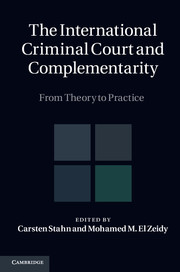Book contents
- Frontmatter
- Contents
- Acknowledgments
- Foreword by HE Judge Sang-Hyun Song
- Foreword by Patricia O’Brien
- Foreword by Silvia A. Fernandez de Gurmendi
- List of abbreviations
- Introduction: bridge over troubled waters?
- PART I General reflections
- PART II Origin and genesis of complementarity
- PART III Analytical dimensions of complementarity
- PART IV Interpretation and application
- PART IV (Continued) Interpretation and application
- PART V Complementarity in perspective
- PART VI Complementarity in practice
- 31 Making complementarity work: maximizing the limited role of the Prosecutor
- 32 Positive complementarity in action
- 33 Complementarity and the construction of national ability
- 34 The Colombian peace process (Law 975 of 2005) and the ICC’s principle of complementarity
- 35 Darfur: complementarity as the drafters intended?
- 36 Complementarity in Uganda: domestic diversity or international imposition?
- 37 Courts, conflict and complementarity in Uganda
- 38 Chasing cases: the ICC and the politics of state referral in the Democratic Republic of the Congo and Uganda
- 39 A problem, not a solution: complementarity in the Central African Republic and Democratic Republic of the Congo
- 40 Complementarity and the impact of the Rome Statute and the International Criminal Court in Kenya
- Index
- References
38 - Chasing cases: the ICC and the politics of state referral in the Democratic Republic of the Congo and Uganda
from PART VI - Complementarity in practice
Published online by Cambridge University Press: 05 November 2014
- Frontmatter
- Contents
- Acknowledgments
- Foreword by HE Judge Sang-Hyun Song
- Foreword by Patricia O’Brien
- Foreword by Silvia A. Fernandez de Gurmendi
- List of abbreviations
- Introduction: bridge over troubled waters?
- PART I General reflections
- PART II Origin and genesis of complementarity
- PART III Analytical dimensions of complementarity
- PART IV Interpretation and application
- PART IV (Continued) Interpretation and application
- PART V Complementarity in perspective
- PART VI Complementarity in practice
- 31 Making complementarity work: maximizing the limited role of the Prosecutor
- 32 Positive complementarity in action
- 33 Complementarity and the construction of national ability
- 34 The Colombian peace process (Law 975 of 2005) and the ICC’s principle of complementarity
- 35 Darfur: complementarity as the drafters intended?
- 36 Complementarity in Uganda: domestic diversity or international imposition?
- 37 Courts, conflict and complementarity in Uganda
- 38 Chasing cases: the ICC and the politics of state referral in the Democratic Republic of the Congo and Uganda
- 39 A problem, not a solution: complementarity in the Central African Republic and Democratic Republic of the Congo
- 40 Complementarity and the impact of the Rome Statute and the International Criminal Court in Kenya
- Index
- References
Summary
This chapter explores the practical implementation of the International Criminal Court's (‘ICC’) principle of complementarity in the situations of the Democratic Republic of the Congo (‘DRC’) and Uganda. Drawing on four years of fieldwork and more than 400 interviews with international and domestic actors, including rural populations in eastern DRC and northern Uganda, the chapter analyses how the principle of complementarity – especially within the ICC Office of the Prosecutor – has evolved theoretically over time, the events on the ground that have triggered significant shifts in the ICC's interpretations, how these changes have translated into practical shifts in ICC policy in the DRC and Uganda, and the often problematic outcomes of these strategies, principally for the long-term maintenance of the domestic rule of law. The paper advocates a significant re-think of complementarity in both theoretical and practical terms, especially in countries such as the DRC and Uganda that are experiencing ongoing conflict and major domestic legal reform.
Introduction
With the inaugural review conference of the Rome Statute taking place in Uganda in June 2010, the International Criminal Court (‘ICC’) is arguably nearing the end of its beginning. Sufficient time has now elapsed to evaluate the ICC's first steps, with the understanding that how it has commenced its work will greatly determine how it develops in the future. In particular, the ICC's current investigations and prosecutions in the Democratic Republic of the Congo (‘DRC’) and northern Uganda – the first in the Court's history – establish important precedents for its future operations. They also highlight a range of significant challenges the ICC faces in delivering international justice, principally its reliance on domestic governments when conducting investigations during ongoing conflict and when state actors are among the principal perpetrators.
- Type
- Chapter
- Information
- The International Criminal Court and ComplementarityFrom Theory to Practice, pp. 1180 - 1203Publisher: Cambridge University PressPrint publication year: 2011
References
- 5
- Cited by



